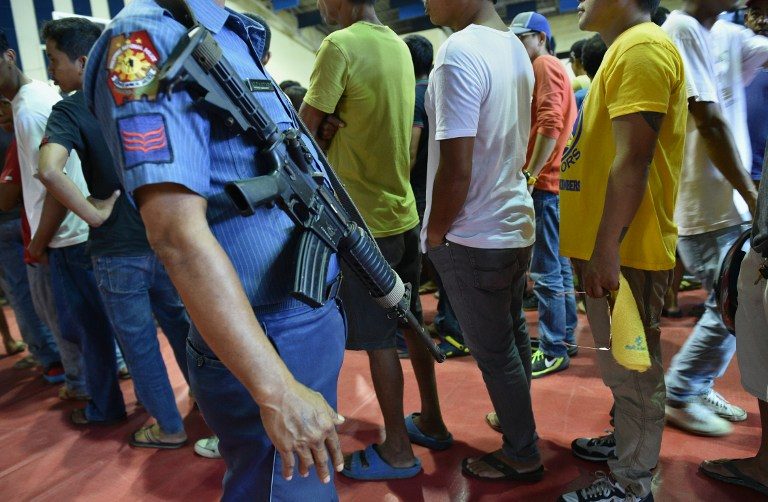SUMMARY
This is AI generated summarization, which may have errors. For context, always refer to the full article.

MANILA, Philippines – Residents of Quezon City (QC) urged the local court to rule on the legality of house-to-house surveillance and drug testing by barangay officials and policemen.
The issue is a subject of a petition for prohibition that has now been submitted for decision by the QC Regional Trial Court (RTC) Branch 100.
“The Courts are mandated to resolve these issues if only to pass upon their merits, and the appropriate remedies may be afforded for the protection of the rights of those who sought judicial intervention, or to ensure that such violations will not be repeated in the future,” the residents said in their pleading.
They are represented by the National Union of People’s Laywers or NUPL.
The Office of the Solicitor General (OSG), which represents the police, had argued before the court that the petition is moot because the QC police had vowed not to do it again.
“Since the acts sought to be enjoined had already ceased to exist, petitioners’ cause of action against respondents have been rendered moot and academic,” the OSG said in their comment to the court.
House-to-house
Residents of barangays South Triangle and Payatas in QC alleged that policemen conducted house-to-house surveillance, including collecting urine samples from all household members to be tested for drugs.
Policemen also handed out survey forms where residents were asked to identify who in their household – if any – is involved in drugs.
“Mayabang, talagang, ‘Ano ’to, ano ’yan?’ Parang pagmamay-ari ’yung lugar. Talagang naninindak sila, at alam naman talaga nilang nakakasindak sila,” said lead petitioner Jennifer Ann Mendoza after a court hearing September last year.
(They were arrogant, saying, “What’s this, what’s that?” as if they owned the place. They intended to intimidate because they knew they can intimidate us.)
QC Police District (QCPD) Guillermo Eleazar told the court in that hearing that he has already instructed local cops to stop conducting drug tests on the spot, and to stop handing out survey forms.
Eleazar admitted that some of the policemen may have been “overzealous” in their jobs, but clarified that they are still duty-bound to join the operations which are led by barangay officials.
“Should these issues be simply set aside on the sole ground that the members of the Philippine National Police retracted and withdrew from further implementing the same, making the issues moot, the probability of repetition remains high, all in the guise of ‘greater good’ at the expense of enjoyment of our civil rights,” the petitioners said.
Rights violated?
The petitioners anchored their arguments on alleged violations of their rights to privacy and against self-incrimination.
The OSG disagreed. Eleazar said the drug testing and filling out of survey forms were on a voluntary basis.
“As such, it was not violative of the petitioners’ right to privacy,” the OSG said.
They added: “When one voluntarily submits to a search or consents to have it made on his person or premises, he is precluded from later complaining thereof.”
Petitioners said they obliged to the drug test and survey forms mainly because they were “gripped with fear for their lives.”
But for the OSG, this is a “mere perception rather than fact.”
The OSG also said the survey forms were not self-incriminating.
“It does not require any admission from a resident as to his own commission of a crime: it merely asks about the presence of any drug addict in the surveyed household which, by itself, is not self-incriminatory,” the OSG said.
SC petition
The petitioners’ urgent prayer for a Temporary Restraining Order (TRO) has been denied.
At the Supreme Court (SC), two lawyer groups are asking to declare unconstitutional the very circulars that operationalized the war on drugs. The petitions are considered the first holistic petition against the campaign.
(Read highlights of oral arguments on those petitions here: Day 1 | Day 2 | Day 3)
NUPL hopes to resolve a local case first.
“If at all, these issues should have been dealt with head on and substantially by the public respondents…after all, they owe it to the public, from whom their powers to execute our laws emanate, an extensive explanation for their dubious acts,” NUPL said.
In the bigger picture, meanwhile, Solicitor General Jose Calida is refusing to heed an SC order to provide full documentation of the over 3,000 deaths that resulted from legitimate police anti-drug operations. – Rappler.com
Add a comment
How does this make you feel?
There are no comments yet. Add your comment to start the conversation.